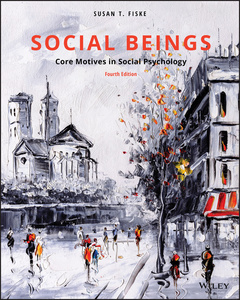Social Beings (4th Ed.) Core Motives in Social Psychology
Auteur : Fiske Susan T.

By delving into the motivations behind attraction, helping, bias, persuasion, aggression, and more, this book helps students grasp the complex interplay of internal and external cues and influences that inform every interaction. An emphasis on real-world applications relates social psychology principles to everyday life, and this latest revision has been updated with the most recent research and trends to provide an accurate picture of the state of the field. Blending traditional topics with new developments in an informal, readable style makes this the ideal text to ignite students? deeper interest and full engagement with social psychology concepts.
1 INTRODUCTION: ADAPTIVE MOTIVES FOR SOCIAL SITUATIONS, VIA CULTURES AND BRAINS
2 SCIENTIFIC METHODS FOR STUDYING PEOPLE IN INTERACTION
3 ORDINARY PERSONOLOGY: FIGURING OUT WHY PEOPLE DO WHAT THEY DO
4 SOCIAL COGNITION: MAKING SENSE OF OTHERS
5 THE SELF: SOCIAL TO THE CORE
6 ATTITUDES AND PERSUASION: CHANGING HEARTS AND MINDS
7 ATTRACTION: INITIATING ROMANCE, FRIENDSHIP, AND OTHER RELATIONSHIPS
8 CLOSE RELATIONSHIPS: PASSION, INTERDEPENDENCE, COMMITMENT, AND INTIMACY
9 HELPING: PROSOCIAL BEHAVIOR
10 AGGRESSION: ANTISOCIAL BEHAVIOR
11 STEREOTYPING, PREJUDICE, AND DISCRIMINATION: SOCIAL BIASES
12 SMALL GROUPS: ONGOING INTERACTIONS 389
13 SOCIAL INFLUENCE: DOING WHAT OTHERS DO AND SAY 428
14 CONCLUSION: SOCIAL BEINGS 450
Susan T. Fiske is Eugene Higgins Professor, Psychology and Public Affairs, Princeton University (Ph.D., Harvard University; honorary doctorates, Université Catholique de Louvain‐la‐Neuve, Belgium; Universiteit Leiden, the Netherlands; Universität Basel, Switzerland; Universidad de Granada, Spain). She investigates social cognition, especially cognitive stereotypes and emotional prejudices, at cultural, interpersonal, and neural levels. Author of about 350 articles and chapters, she is most known for theories and research on how people think about each other: the continuum model of impression formation, the power‐as‐control theory, the ambivalent sexism theory, and the stereotype content model (SCM).
The U.S. Supreme Court cited her gender‐bias testimony, and she testified before President Clinton's Race Initiative Advisory Board. These influenced her edited volume, Beyond Common Sense: Psychological Science in the Courtroom. Currently an editor of the Annual Review of Psychology, PNAS, Policy Insights from Behavioral and Brain Sciences, and Handbook of Social Psychology, she has written the upper‐level text Social Cognition: From Brains to Culture (4/e). She also wrote The Human Brand: How We Relate to People, Products, and Companies, which applies her models to how people perceive corporations. Her general‐interest book, funded by a Guggenheim and the Russell Sage Foundation, is Envy Up and Scorn Down: How Status Divides Us.
She has been elected to the National Academy of Sciences, the American Academy of Arts and Sciences, and the American Philosophical Society. She has served as President of the Association for Psychological Science (APS) and President of the Federation of Associations in Behavioral and Brain Sciences, as well as its FABBS Foundation. Because it takes a village, her graduate students and lab alumni conspired for her to win Princeton's Mentoring Award. She is grateful to be the only
Date de parution : 08-2018
Ouvrage de 592 p.
20.1x25.2 cm
Thème de Social Beings :
Mots-clés :
Psychology



